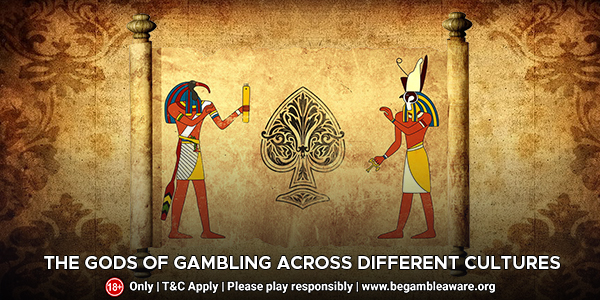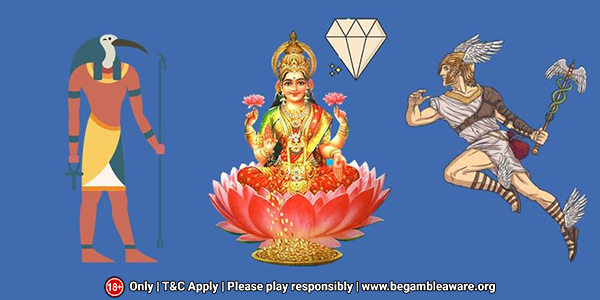
Lady luck is the most beloved companion, even though she can be difficult to please. People have believed that supernatural powers have helped them throughout history. Many people associate mischief and trickery with the god of gambling from different parts of the world.
While some of the playful malignancies were lighthearted, others led to devastating events. Some of these gods of gambling are still well-known today, and some are still used to help gamblers. We will explore ancient deities who were either portrayed as god of gambling or whose character flaws led to them being labeled that way.
Gefjon – Nordic Region
The pantheon Nordic gods have become a very popular art form, appearing in films and books. Gefjon is the Nordic god of gambling. Although she is mentioned in ancient texts dating back to the ninth century, little is known about her.
Gefjon is the patron goddess for good fortune, fertility, agriculture, and abundance. In old Norse, her name means “Generous One” (or “Giver”)
Hermes
Hermes, the Greek God of Gambling, is among many other things. Perhaps you’ve heard of Hermes. He is the messenger of the gods from Greece, wearing a small round hat and winged sandals. He lives on Mount Olympus, along with his father Zeus and 11 others.
Hermes was born and raised in one day. His mom Maia gave birth to him immediately. It was obvious that he was special. Hermes is often called the “divine trickster,” and it turns out that he was always up to his cheeky antics since day one.
Hermes, the half-brother to his brother, stole the cattle of his cattle and invented the lyre before it was even out. Hermes has been named the God of gambling because of his reputation for being a cunning trickster and his ability to outsmart other gods.
According to Greek legend, Hermes was called a cheater, thief, and crafty. However, people have prayed for luck ever since he invented dice.
Macuilxochitl
Macuilxochitl, the Aztec God, is responsible for gambling. He is one of five deities that represent indulgence and excess. This idea of excess is also represented in Aztec culture by the number 5.
Macuilxochitl translates to “five flowers.” Each of the five deities has a name that begins with the number 5. These deities are also the names for days in the Aztec calendar. They are known as the “tonalpohualli.”
Macuilxochitl is also known by the name Xochipilli or ‘flower prince.’ He is a God of gambling who does many things. This god is responsible for some of life’s most amazing and creative pleasures.
This god of gambling is associated with music, dancing, writing, feasts, games, and gambling. Macuilxochitl is not without risk but is the one who defines the line between pleasure.
People who indulge in inappropriate behavior could end up with venereal disease, hemorrhoids, and boils. This is one god of gambling you would want to keep on the nice side.

Nohoi Lpi
Nohoilpi, the Navajo God for gambling, is also known as The Great Gambler. Nohoilpi, a mythical figure, loved to play games every time.
He wore an enormous turquoise talisman. Every gambler loves to have a lucky charm.
After a while, he had become accustomed to betting after wager and getting what he wanted. Nohoilpi was now cocky. He had already won houses and the homes of their families. These poor people were enslaved by him and used to build a city of honor.
However, this abuse was not overlooked. Other Navajo deities noticed the evil acts, and they devised a plan to teach him a lesson. The gods granted ordinary man gambling abilities during a night of mystical dancing and singing.
This allowed him to beat Nohoilpi and free all the slaves. The gods helped the man, and Nohoilpi was stripped of all his possessions.
Nohoilpi, who the people now freed, was taken up into the skies. This cautionary tale is a good reminder to all gamblers that even the most skilled can get greedy. No one, not even a god, is immune from gambling’s consequences.
Nezha
Nezha, the mischievous Chinese god for gambling and fortune.
To defeat the demons of the earth, Nezha was sent to the womb of his mother by the Jade Emperor. Lady Yin, his mom, was three and a quarter years pregnant before finally giving birth.
Li Jing, his father, was furious, believing that the demon was attacking him. He drew his sword and attacked the fleshy ball, splitting it in half. Nezha emerged, not as a weeping infant but as a walking, talking boy.
Nezha was one day playing in the ocean with other children. Nezha accidentally killed Ao Guang’s son in a mishap. This was terrible news as Ao Guang was the East Sea Dragon King.
The King became angry and threatened to unleash a massive flood. Nezha had caused much shame to his family, and so the little boy committed suicide. Nezha was not left alone.
His teacher Taiyi Zhenren brought Nezha back to life with some creative additions, much like Dr. Tenma did with Astro Boy. Nezha had a fire-tipped sword and a pair of wind fire wheels. These were particularly useful for him to fight his father, who still hadn’t forgiven him.
Last Thoughts
If you are playing at online slots with Egyptian or Greek-themed slot machines, remember the rich history. It is fascinating to think about how the god of gambling continues to influence punters today.
Perhaps you would like to offer a silent prayer of thanksgiving to these powerful gods in the hopes of getting the next big jackpot. Let’s hope the god of gambling blesses you with all the luck possible for your next session.